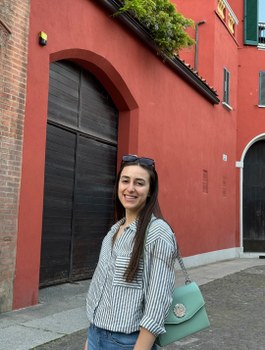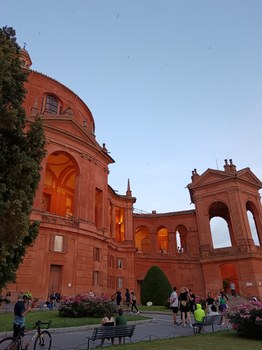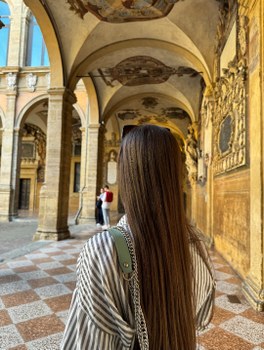Viktorija Trajkoska is a Student Ambassador from Macedonia, pursuing a Master’s Degree in Electrical Energy Engineering at the University of Bologna.
Published on 22 January 2025 | Europe

Applying and Arriving in Italy
In my first days in Bologna, I was super excited to start studying at one of the best universities in Italy and the oldest in the world, with the ambition of obtaining a specialized degree. However, at the same time, I struggled with documentation issues as someone who graduated less than two months before coming to Italy. As a non-EU student, there are bureaucratic procedures to follow, and they don't happen quickly. The application process is not hard and doesn’t take much time, but once accepted, obtaining a visa in your home country, enrolling at UNIBO, and securing a residence permit once you arrive in Italy can be a headache.
If you plan to enroll at UNIBO immediately after graduation, my advice is to do thorough research in advance. Many students take a one-year gap to finish their previous studies and prepare all the documents, especially if applying for scholarships. Fortunately, the UNIBO website is equipped with all the information you need, and the International Desk team is very responsive, replying quickly and with patience. They understand that new students need their guidance. For further help, UNIBO students can also rely on the regional ER-GO desk, which provides support to all international students.

Adjusting to Life in Bologna
Accommodation is the hardest part of living in Bologna. There’s no magic trick to finding a room, but there are tips that can help. Be careful of scams, especially in Facebook groups or on Italian websites, since these will likely be your main platforms for searching for accommodation from your home country. Try to connect with other students or people from your country already living in Italy. Joining social media groups and checking the UNIBO and ER-GO websites can also be helpful. I personally found my apartment through the SAIS website, which is very helpful for international students and secure since it’s regulated by the university. This is a significant advantage compared to private agencies, which can be very costly.
When I arrived in Italy, I was already speaking Italian and knew a lot about the culture thanks to an Italian course I took during my bachelor’s studies. This helped me make connections with Italians and improve my fluency. Italians are supportive and try to engage in conversations even if you only speak basic Italian. For those not yet fluent, I recommend showing interest in the language and culture—watch Italian movies, enjoy the food, listen to the music, and even learn a few songs to sing at karaoke! UNIBO also offers Italian courses, so make sure to find out how to enrol based on your level. It starts with you, so don’t be shy!

Making the Most of Your Time
The educational system in Italy is different from what I was used to, and adapting was a challenge. Personally, I wish there were more laboratory activities, as I enjoy hands-on learning, but the theoretical approach here prepares you to specialise in your field, particularly if you’re interested in research or pursuing a PhD. What I appreciated most was the ability to choose many of my second-year subjects, including specialised courses or even classes from other degree programmes. Some professors also organised visits to companies in the power sector, which offered insight into the industry and networking opportunities.
Living in Bologna is a unique experience. It’s a small city, and you can explore much of it within a few months, but you’ll never get bored. UNIBO hosts a variety of events, from seminars and workshops to sports and cultural activities. The city itself offers open-air cinema nights, food festivals, and scenic hikes, among other things. One of my favourite aspects of student life here is the abundance of libraries, which are great places to study and meet new friends. In your free time, I recommend exploring Giardini Margherita, hiking to San Luca, or simply wandering through the city to discover hidden gems like gelaterias or thrift shops. In Bologna, you’ll feel like both a tourist and a local, even after living here for a while.